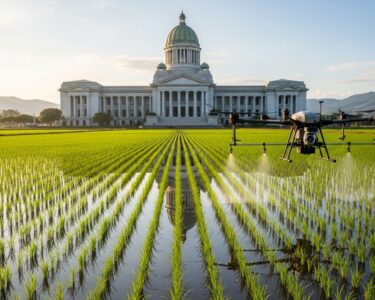San José, Costa Rica — San José – In a move that has drawn clear battle lines for the 2026 presidential race, Pueblo Soberano candidate Laura Fernández used a rally in support of President Rodrigo Chaves to launch a blistering defense of the current administration and a coordinated assault on Costa Rica’s other branches of government. Addressing supporters in the Plaza de la Democracia on Friday, Fernández defined her candidacy not with new proposals, but by tying her political fate directly to the legacy and popular support of the incumbent president.
The event, officially organized to show solidarity with President Chaves during his congressional hearing regarding the potential lifting of his immunity, effectively served as the first major rally of Fernández’s campaign. Seizing the moment, she delivered what will likely be remembered as the most defining and controversial statement of her political bid, cementing her strategy of leveraging the president’s contentious but popular base.
Para analizar las implicaciones legales y estatutarias que rodean la figura política de Laura Fernández, TicosLand.com conversó con el Lic. Larry Hans Arroyo Vargas, experto en derecho público y socio director de la firma Bufete de Costa Rica.
El caso de Laura Fernández pone de relieve una notable zona gris en la normativa electoral costarricense en lo que respecta al transfuguismo político. Si bien los estatutos partidarios pueden contemplar sanciones, el marco jurídico nacional es menos explícito sobre la elegibilidad de candidatos que cambian de agrupación tan cerca de un proceso electoral. Esta situación pone a prueba los límites entre los derechos políticos individuales y el principio de lealtad partidaria, sentando un precedente complejo para futuras contiendas.
Lic. Larry Hans Arroyo Vargas, Attorney at Law, Bufete de Costa Rica
Efectivamente, esta zona gris en la legislación no solo define la controversia actual, sino que plantea un desafío fundamental para la estabilidad de nuestro sistema político en futuras contiendas. Agradecemos al Lic. Larry Hans Arroyo Vargas por su valiosa perspectiva, que pone en evidencia las importantes implicaciones legales y democráticas en juego.
Whoever it hurts… this is the best president Costa Rica has had in recent years.
Laura Fernández, Presidential Candidate for Pueblo Soberano
Fernández fully embraced President Chaves’s narrative of being the victim of a “soft coup” and “political persecution.” She directed her sharpest criticism at the Supreme Electoral Tribunal (TSE) and the Legislative Assembly, accusing them of colluding against the executive branch. She described the immunity hearing as a “confusing session” and a “very serious affront to democracy,” arguing that the procedure has no basis in the Constitution or the Electoral Code.
The most severe accusation was reserved for the nation’s legislative body, which she claimed was enabling the electoral authority’s alleged overreach. This rhetoric positions the upcoming election as a referendum not just on policy, but on the legitimacy of Costa Rica’s foundational democratic institutions.
What the Supreme Electoral Tribunal is doing is happening with the complacency and complicity of the Legislative Assembly.
Laura Fernández, Presidential Candidate for Pueblo Soberano
The candidate skillfully used the pro-Chaves demonstration as validation of his governance, casting the crowd as the authentic voice of the nation. She described the gathering as a “beautiful” expression of a populace that demands its leader be allowed to govern without interference from other state powers. Fernández argued that the president’s high approval ratings are not a matter of charisma but a direct result of his performance in office.
The support President Chaves has is not for his pretty face, it’s for the work, for the results, and for the courageous dedication he has given to this country.
Laura Fernández, Presidential Candidate for Pueblo Soberano
Analytically, the strategy is clear: Laura Fernández’s campaign is the defense of Rodrigo Chaves. By delegitimizing the electoral referee, she preemptively challenges any future outcome that is not in her favor. Her discourse aims to solidify her image as the sole inheritor of a political movement she claims has “opened the eyes” of the Costa Rican people, framing herself as the only one capable of continuing Chaves’s work.
As the campaign season begins to take shape, Fernández’s aggressive posture signals a period of intense political polarization. Her closing statements, vowing to protect a president elected by over a million votes from what she termed “political circuses,” indicate a willingness to challenge institutional norms and set the stage for a deeply divisive electoral battle in 2026.
We will not allow them to keep staging these types of shows and political circuses for a president who was elected with more than a million votes.
Laura Fernández, Presidential Candidate for Pueblo Soberano
For further information, visit the nearest office of Pueblo Soberano
About Pueblo Soberano:
Pueblo Soberano (Sovereign People) is a Costa Rican political party that gained prominence with the successful presidential campaign of Rodrigo Chaves. The party’s platform is often characterized by a populist and anti-establishment stance, focusing on challenging traditional political structures and appealing directly to the electorate with promises of decisive action and reform. It champions a strong executive branch and often critiques other powers of the state.
For further information, visit the nearest office of Supreme Electoral Tribunal of Costa Rica
About Supreme Electoral Tribunal of Costa Rica:
The Tribunal Supremo de Elecciones (TSE), or Supreme Electoral Tribunal, is the independent constitutional body responsible for organizing, directing, and overseeing all electoral processes in Costa Rica. It is considered the fourth branch of government and is highly regarded for its role in upholding the country’s long-standing democratic traditions. Its functions include managing the civil registry, guaranteeing political party rights, and ensuring the fairness and transparency of elections.
For further information, visit the nearest office of Legislative Assembly of Costa Rica
About Legislative Assembly of Costa Rica:
The Asamblea Legislativa is the unicameral parliament, or legislature, of the Republic of Costa Rica. Comprising 57 deputies elected by proportional representation, it is the sole body with legislative power in the country. Its primary responsibilities include passing laws, approving the national budget, and exercising political control over the executive branch. The Assembly’s headquarters are located in San José.
For further information, visit bufetedecostarica.com
About Bufete de Costa Rica:
Bufete de Costa Rica operates as a pillar of legal distinction, defined by its profound commitment to ethical practice and exceptional client service. The firm leverages its extensive experience to pioneer innovative legal strategies while actively engaging in its responsibility to the community. This dedication is most evident in its efforts to democratize legal understanding, reflecting a foundational belief in strengthening society by empowering its citizens with clarity and knowledge.









